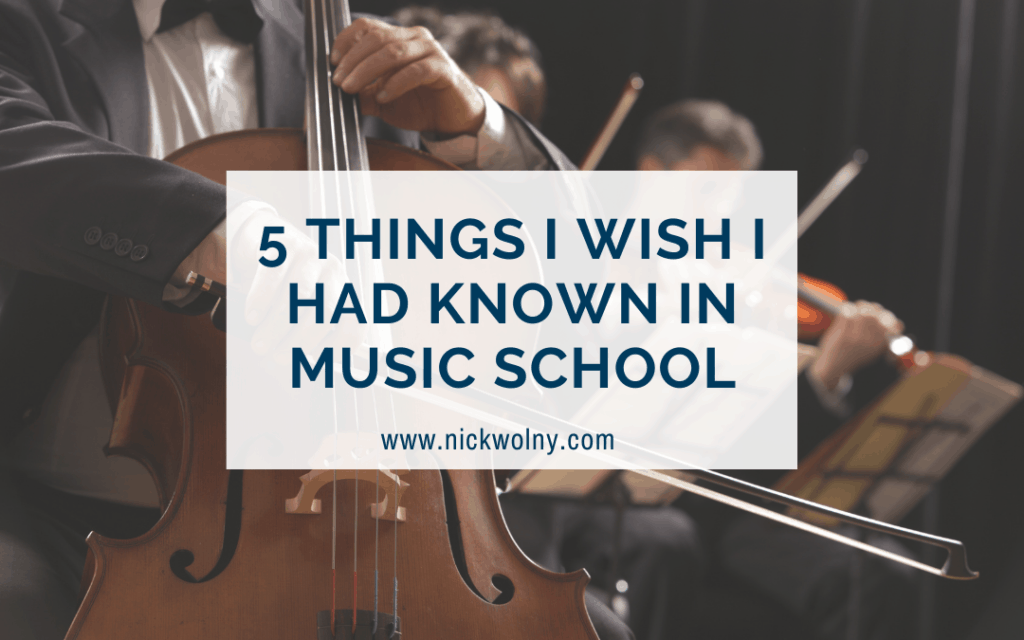5 THINGS I WISH I HAD KNOWN IN MUSIC SCHOOL

Much of the six years I spent in music school were filled with trepidation and worry.
- What if I can’t win an audition?
- What if I get in a car accident and my face becomes disfigured?
- What if I injure myself or develop one of a host of small biological anomalies (carpal tunnel, a frozen muscle) that short circuit a life of music?
(All of these scenarios happened to at least one of my music school comrades, so it isn’t as exaggerated as you might think.)
The problem I had, and that perhaps many young people studying the arts also have now, was that I thought my craft as the only thing I could ever do to make money or feel fulfilled.
So I shunned the idea of learning other skills for fear that they would distract from my ultimate goal, which was to become a world-class sentinel of French Horn awesomeness.
Ten years later, though, things have worked out better than I ever could have imagined.
And I realize there are a few things I would have done differently, and more than a few things I would adjust in my self-talk to be kinder along the path to mastery.
Here are 5 pieces of music conservatory advice I wish I had had.

#1: Learning online business skills can fix your cash crunch
At the time, the #1 reason I abandoned a career and life in classical music was that I was out of money (And, honestly, never really had much to begin with).
Looking back, I had tunnel vision around the different ways I could bring money in while still pursuing my dream.
My perception was salary or bust. In classical music, the only tenure-track salary paths were a career in orchestra (following a guy with a stick) or academia (endless red tape).
Both were also very competitive, and neither weathered the 2008 economic downturn very well.
If you want your career to be more innovative, such as freelancing or touring, it might behoove you to diversify your skill set so you’re more free to pursue creative opportunities while also having control over your pay and quality of life.
Online business continues to grow like wildfire. E-learning, for example, was already a $190 billion industry in 2018, but is projected to become a $325 billion industry by 2025.
These entrepreneurs need skilled help. That means lots of video editing, lots of audio production, lots of website building, and lots of copywriting opportunities will surface in the not-too-distant future.
As my career has developed in business, it’s become a joy (and a necessity, really) to continue learning new skills. Learning and mastering skills helps you build a portfolio career you love.
#2: Rapid skill acquisition is a real thing
I know the prospect of not spending a life in the arts can feel like the apocalypse.
However, you may reach a point in your when you want to diversify. Trust me when I say studying art, music, dance, or theater will give you important career skills.
That’s because the arts teach you to discern tiny details, then act on them quickly and well. You learn to learn fast and adjust on the fly, and lean on your ability to do the job rather than credentials or fancy, expensive pieces of paper.
(Classical musicians are especially used to this, because most professional audition processes are blind and take place behind a screen.)
If you studied the arts for any semi-substantial length of time, you’ll have this competitive edge ingrained in you — forever.
#3: A little isolation is okay, but don’t overdo it
It’s important to have periods of your day or week where you can isolate yourself and work diligently on your craft.
And stoicism has certainly made a resurgence in the last ten years; people see the value in spending time with oneself and with one’s thoughts.
But I overdid it. My undergraduate mentor told me that if I wanted to make it, I shouldn’t date in college, minimize time with friends, and maximize time spent in windowless practice rooms.
I took this to the extreme, though, and really cloistered myself during my time in music school. In retrospect, my resistance to seeing other career prospects stemmed from fear of failure.
It’s important to develop yourself as a whole and complete person. The risk with succumbing yourself to isolation is that your identity becomes wrapped up in how you perform rather than who you are, your personal passions, your thoughts, and your love.
And when your self-worth gets intertwined with how you perform (or worse, how you are judged or scored), things get real messy real quick.
#4: To overcome your student loan, focus on making more money
My student loan payment felt like shackles for ages, especially because I finished grad school and immediately abandoned the thing I spent all those years mastering.
I saw my pay at a local retail job as all I had to work with, which was a limiting mindset.
Here’s what I would tell my younger self: Don’t budget your resources — just make more money instead.
I give all the glory to personal finance gurus who advocate finding a side hustle instead of cutting back on lattés.
Diversifying your skills not only makes you more employable; it’s more likely that you’ll bring home more total bucks each month too.
And nothing is more empowering than using your creativity to increase your pay or freedom.
If you have a student loan, you’re here now, and it’s time to take personal responsibility about it like millions of other people have done and get to work.Want the loan to disappear? Don’t tighten your budget and lower your quality of life; make more money instead.
#5: A high “boredom threshold” is an asset
I have played the opening bars of the Mozart second horn concerto SO MANY TIMES. And I stopped at 24, so imagine how much more professionals have done it!
In a workshop, a master teacher once told me I was ‘probably too smart’ to make it to the top.
This offended me at the time, but now I realize he was referencing something I like to call a “boredom threshold”.
The best players were often the ones who could tolerate repeating the same fundamentals over and over again hundreds of times, especially the stuff that was incredibly mundane.
Their boredom threshold was really high. And we live in a society where having a good boredom threshold can not only help you become more skilled, but also be happier in life.
Rather than vacillating from one pursuit to the next, you’re ready to go the course, do the work it takes each day and month, and have a positive attitude along the way.
Your challenge is to make the boredom fresh, interesting, or engaging along the way. Again, it’s a great opportunity to exercise your creativity.
I don’t know that my younger self would have swallowed all this advice in one gulp.
But I do know my younger self lived in perpetual fear of failure, constant self-flagellation, and deep feelings of loneliness.
Maybe a young artist reading this right now feels this way, too.
So if any of these lessons resonated with you, take them with you. And the ones that didn’t, you can let them fade from your brain and move on with your day.
Best of luck!

